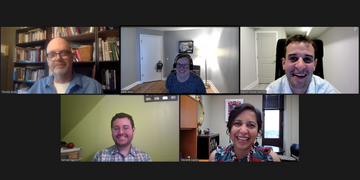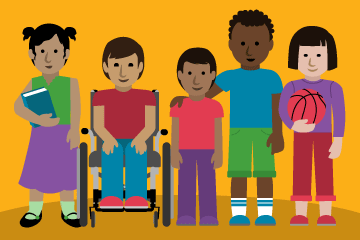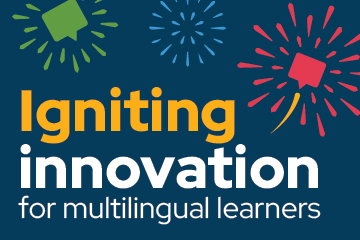Conversations with Tim: New research on multilingual students guides recommendations, actions for educators

This edition of Conversations with Tim features a discussion between Tim Boals, WIDA founder and director, Mariana Castro, Nelson Flores and Sam Aguirre. Mariana is deputy director for the Wisconsin Center for Education Research, Nelson is an associate professor of educational linguistics at the University of Pennsylvania and Sam is the director of WIDA Español.
Together, these Conversations with Tim guests talk about their work examining research on multilingual students and the practical recommendations and actions that educators can use to advocate for and enhance their success.
Let’s join in their conversation as they explore issues like shifting deficit perspectives, supporting students after they exit programming and challenging policies and practices for long-term English learners.
One quick thing before we dive into their conversation…
As you read or listen to Conversations with Tim, you will notice that Mariana, Nelson and Sam refer to a news article series that captures even more of this work. Read all four articles in English y Español:
- From false-positives to advocacy: Shifting deficit perspectives in the identification of English learners
- Ensuring student success: Supporting bi/multilingual students after exiting English learner programming
- Be(com)ing an LTEL: Challenging policies and practices in the education of long-term English learners
- Using active and former English learner data when creating a balanced picture of bi/multilingual students
Note: The article series was written using data from research conducted at The Center on Standards, Alignment, Instruction, and Learning (C-SAIL) and funded through a grant from the Institute of Education Sciences (IES) of the U.S. Department of Education.
For those of you who have access to the 2022 WIDA Annual Conference virtual session recordings, make sure you view “Re-imagining EL Policy: Panel Discussion about Identification, Monitoring, and Reclassification.” This session features this work, too!
And… as if that wasn’t enough extra topical content, Mariana, Nelson and Sam collaborated on a new WIDA Focus Bulletin! Educational Justice Through Policy: The Unintended Consequences of Policy Decisions in the Education of Bi/Multilingual Learners is coming soon!
Alright, back to Conversations with Tim…
Listening option: Listen to the audio here or continue reading this abridged version of their conversation. Note: This conversation took place in July 2022.
Tim: We have a wonderful group today – not just one person, but three! It’s so nice to have this conversation with all of you. I’m going to start with Nelson. Tell us about C-SAIL and the recent research that we've featured in a series of WIDA news articles.
Nelson: C-SAIL is an IES-funded research center that I worked with under the leadership of Andy Porter at the University of Pennsylvania. Overall, the project looked at the implementation of college and career-ready standards across several partner states. They wanted to look at students officially classified as English learners (ELs). So, they invited me to help them think it through.
One of the things that came up in our interviews was debates around the classification and reclassification of students as ELs and the idea of students being false positives — or falsely positively classified as ELs.
Another thing that came up was the idea of wanting to reenter students into EL status. When we think of the more common definition of a reentry program, it’s usually a program that's designed to help people coming out of prison to reacclimate to the general population. But in this sense, it was about bringing them back into the “prison” to best meet their needs.
As a researcher, I wanted to understand where these ideas come from. In the article that I published, which inspired the WIDA news articles, I trace the history of how we came to frame policy in this way to the remedial orientation of the Bilingual Education Act of 1968. Bilingual education advocates wanted bilingual education for all bilingual students. But that's not what the law ended up becoming. You had to justify that students were “limited enough in English” for them to be eligible for bilingual education. Proponents of bilingual education wanted that threshold to be as rigorous as possible for more students to be eligible for bilingual education. They began to make the case for that by first saying that even students who knew English may not really know English because they were “semi-lingual.” That they hadn’t developed a strong foundation in any language.
As that term got quickly and rightly critiqued — since you can’t develop an asset-based approach by starting from the perspective that students lack language — the conversation switched to the more common dichotomy that’s still used today of BICS and CALP. The idea is that students have basic interpersonal communication skills (BICS) in English and possibly their home language, but that they don't have cognitive academic language proficiency (CALP).
I provide that history to think through, in some ways, what the debate is informed by. It's coming from this remedial frame that wasn't the frame that bilingual education advocates wanted. It became institutionalized in such a way that, ironically, deficit frameworks are being used to describe students and continue to reproduce a dichotomous framing of students as either limited in English to justify getting extra support, or not limited in English which prevents them from getting extra support.
I was invited to bring experts from the field to have conversations with C-SAIL about these issues and I couldn't think of anyone better than Mariana and Sam.
Mariana: What appealed to me at this stage of the project is that they've done the research, they've written articles, but there's this willingness to get the research into the hands of practitioners, and into the context of what is going on in schools and districts. These are complex issues, and we tend to simplify them. For many of us practitioners — I’m counting myself — I used to think about research as something that happens super far away with people talking about stuff that doesn't happen in the classroom. Really, research is — at least in education — about what is going on in the classroom.
Tim: This research is extremely important. We need to have more of these conversations! Mariana, let's dig into the first article that you published back in February. It was about shifting deficit perspectives and identification of English learners. What did the research tell you and what is the most important takeaway for educators?
Mariana: What Nelson and his colleagues talk about are false positives and how we create this image of bilingualism, which is something that should be celebrated, and we turn it into this deficit perspective. We do so not just by the labels, but the labels represent both the policy and the unintended consequences. All the funding is attached to these particular labels.
Sometimes an administrator might know that a student needs help, but they don't fit the idea of an EL — and they don't easily fit somewhere else either. It's because we think about kids in terms of these buckets, and if they don't fit, we look for another bucket to put them in. What would it look like if we got rid of those buckets?
The most important takeaway from this article is for people to be thoughtful about the words we use to describe students. We call ourselves educators because for us what matters is education, but are we okay with calling children struggling readers or at risk? The blame is shifted onto children when it's our system. We need to think about how we take policy and adapt it to our reality. Something missing in all of this is student voices or family voices — people who really appreciate the skills and the assets. We say that we appreciate bilingualism, but it doesn’t always align with the practices that we have. What would it look like? We have partial answers, but the more voices that we bring in, I think the better answers we can find.
Tim: Yes! These are real students we're talking about and it's essential that we keep discussing these issues. Sam let's talk about the second article, which was about how we can support multilingual students after exiting English learner programming. What did the research tell you and what is the most important takeaway for educators?
Sam: In this article, the focus is on bringing clarity to what it means to support students once they exit EL services or the EL designation. Even more so, how do we do right by students?
Two things to take away from this article: There are policy opportunities that we need to be very mindful of as educators — and even as parents and community leaders. Once students have met that English proficiency on their assessment, they should still be receiving services and continue to be monitored to receive those services for two additional years. So, if a student needs additional support, they can always be receiving the services without having to be retested or reentered into an EL designation.
Another one is the four-year mark. Students’ data and their performance on state assessments is tracked for four years to see how they're doing and for re-evaluating. That is something that is required by the Every Student Succeeds Act (ESSA) and is something that we should leverage. At the same time, we don't have to limit it to that. There is no need for us to be thinking about reentry or remedial services when all students should have access to bilingual education or multilingual services in some way.
We should be thinking about the labels we use and how we could get rid of them, as well as how we could create systems that are truly supportive of the bilingualism and multilingualism of our students — independent of whether they have been given the EL label or not. There are some opportunities that the EL designation brings because of the funding, but we need to challenge those; and we need to figure out how to do right by students and bring equity into the student population by providing them the services they need.
Tim: That’s really important. We need to stop remediating and start accelerating learning for students. That mind shift is so important. Nelson, in your latest article about challenging policies and practices in the education of long-term English learners — as we call them in this case — what did the research tell you and what is the most important takeaway for educators?
Nelson: What’s interesting is that long-term EL is a concept that I can't get away from. It's been in my life since I was an ESL teacher in the Bronx and it's what motivated me to get a doctorate and to think more deeply about these issues.
When I was an ESL teacher, most of my students, who were in high school, were born in the Bronx and I was supposed to be giving them ESL instruction — which didn't make any sense to me. I was using the terminology that I had learned in my teacher education program, like the BICS and CALP dichotomy, and I was saying they have BICS but they didn't have CALP, and my job was to fix their deficiencies. I quickly became uncomfortable with that framing because I saw all the things that they did with language every day and I didn't see a deficiency. I saw much bigger problems and challenges that the school and the surrounding community had that were the root of the issue, not the language practices of the students.
I wasn't planning on talking about long-term ELs as part of the C-SAIL study, but it came up in the interviews because educators at every level are thinking about this term — it's a growing term and category of students. At this point, I’m of the school of thought that I’m not sure how helpful the label is for the student. And I think, not just in terms of the deficit frameworks that it perpetuates of students who were born in the U.S. but are still framed as not knowing English, which is itself a problem, but the actual consequences that it has for students in terms of lack of access to college prep classes. Which then prevents them from going to college, or if they go to college, they go to community college and are put into ESL again.
If the question is how best to support students that are currently classified as long-term ELs, it seems to me that, empirically, the impact of the categorization itself suggests that the category is not actually serving that purpose right now. If the category is denying them access to the types of coursework that will provide them access to college, then the categorization is not doing the job that it's supposed to be doing.
It goes back to what Sam and Mariana said about supporting students as students, rather than as members of particular classifications. Especially when those classifications seem to come with negative consequences in terms of their future prospects.
Tim: That's the irony: in keeping kids out of the rigorous classes, we’re denying them the very opportunities they need to do well in rigorous classes. We've got to get them in these classes, and we have to engage the learners in ways that help them move forward. That’s what we mean when we say, “accelerating learning opportunities.”
Mariana, tell us how we can learn more about this work and what resources you’re planning to share.
Mariana: The main goal of this conversation is to engage practitioners in the complexity of this issue and in advocacy. One of the things we're planning is a WIDA Focus Bulletin. In it, we have interviews with people in the field and how they are wrestling with these issues and what they're thinking.
I think one of the most important pieces is that there's all this information which we put out there, but how do we braid it in with the work that we're doing? As part of the different circles of influence that we have, we're constantly thinking about it. With the work that I do with Sam on WIDA Español, we're always thinking about what are the labels that we use with students. What histories do those labels have? How do we carry on and remind ourselves that we are standing on the shoulders of people who have been big advocates?
Like Nelson said, the original intentions of some of these policies and legislation were never fulfilled, so how can we move closer to that? And how can we break some barriers to start thinking differently about the need to label certain things? That's where there's the importance of braiding the practice with what we're learning about policy and research to make real change.
Tim: Absolutely! Thank you, Mariana, Nelson and Sam. This has been a wonderful conversation today — so needed.
About Conversations with Tim
Conversations with Tim, WIDA Founder and Director is a WIDA news article series that features a conversation between WIDA Founder and Director Tim Boals and a colleague or two in the field of multilingual learner education. Together, they discuss the important innovation, research and collaboration taking place today.





